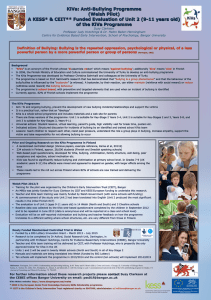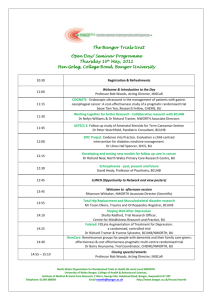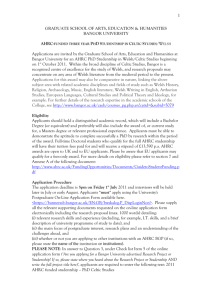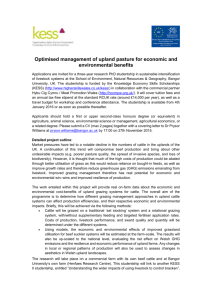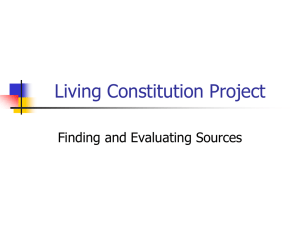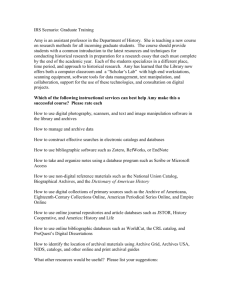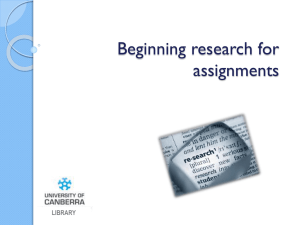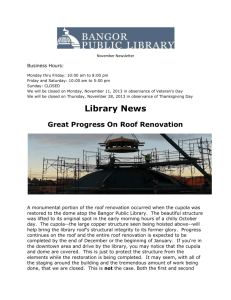1. Beginning your information search - Pathways
advertisement
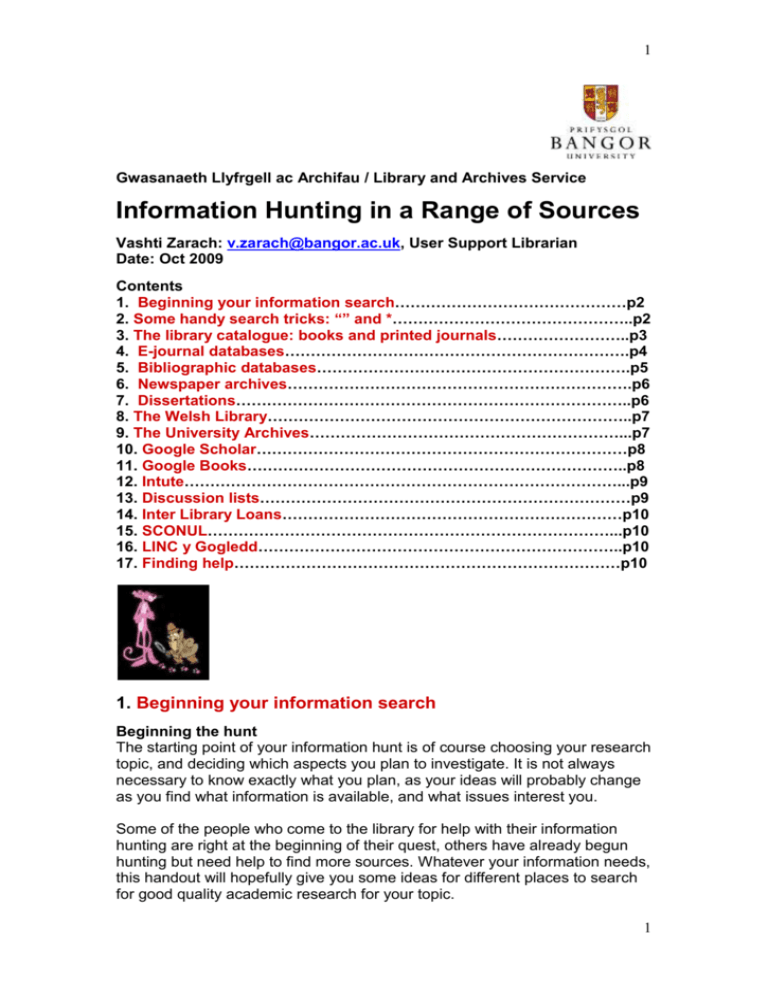
1 Gwasanaeth Llyfrgell ac Archifau / Library and Archives Service Information Hunting in a Range of Sources Vashti Zarach: v.zarach@bangor.ac.uk, User Support Librarian Date: Oct 2009 Contents 1. Beginning your information search………………………………………p2 2. Some handy search tricks: “” and *………………………………………..p2 3. The library catalogue: books and printed journals……………………..p3 4. E-journal databases………………………………………………………….p4 5. Bibliographic databases…………………………………………………….p5 6. Newspaper archives………………………………………………………….p6 7. Dissertations…………………………………………………………………..p6 8. The Welsh Library……………………………………………………………..p7 9. The University Archives……………………………………………………...p7 10. Google Scholar………………………………………………………………p8 11. Google Books………………………………………………………………..p8 12. Intute…………………………………………………………………………...p9 13. Discussion lists………………………………………………………………p9 14. Inter Library Loans…………………………………………………………p10 15. SCONUL……………………………………………………………………...p10 16. LINC y Gogledd……………………………………………………………..p10 17. Finding help…………………………………………………………………p10 1. Beginning your information search Beginning the hunt The starting point of your information hunt is of course choosing your research topic, and deciding which aspects you plan to investigate. It is not always necessary to know exactly what you plan, as your ideas will probably change as you find what information is available, and what issues interest you. Some of the people who come to the library for help with their information hunting are right at the beginning of their quest, others have already begun hunting but need help to find more sources. Whatever your information needs, this handout will hopefully give you some ideas for different places to search for good quality academic research for your topic. 1 2 Choosing your topic The initial stage is selecting your topic to research. You may have a very broad subject area (e.g. forestry), or you may have a more focused idea of your subject of study (e.g. ancient oak trees in the British Isles). Your first stages are to read a little around your topic, and decide what you initially think you are going to want to focus on in your essay or dissertation. At this stage you can use both academic and non academic sources to think around your topic; e.g. although you would not generally quote Wikipedia in a piece of academic writing, it can be useful at the early stages of research. Choosing your key words for searching Once you have even a rough idea of your topic, you should be able to reduce it down into some key words for searching. Key words are extremely important for finding information, and you should list: a) different words you might use to find information on your topic b) words which will help narrow down the search to suit your focus You will probably add to your list of key words as you hunt, and find new words which are commonly used in relevant articles and books. Every search is unique Every information search is different, and therefore different sources will prove most useful. For some searches you may find more relevant information in the electronic resources, for others, most of the best information may be in books. For good marks, you will need to demonstrate that you have used a range of sources, including books, academic journals, and any other relevant sources. In summary… Begin with making some notes on your topic of choice (vague or more definite), and write down the search words you plan to use. 2. Some handy search tricks: “” and * Quotation marks “” Quotation marks enable you to search keywords as a phrase and can be very useful. Try searching a name or a phrase on Google with and without putting it in quotation marks… For example, if you look on Google for swish of the curtain (a children’s book), you will find links to the book details, but also links to sites selling curtains. By searching for “swish of the curtain” you instantly find more relevant results. Truncation marks: * The truncation mark * allows you to type in part of a word and search for various endings at the same time, e.g. typing in adventur* will search for adventure, adventures, adventurer and adventuring. 2 3 3. The library catalogue: books and printed journals Quick catalogue search The logical starting point for information searches is the library catalogue. At best, you will find a wide range of books and journals for your search, at worst, you will confirm that your topic is too recent or too specialist to be well served by the library’s book collection. For the initial search, you can just type keywords in to the quick catalogue search: http://library.bangor.ac.uk/search~S1. If there are only a few results for your search, you can check through them; if there are far too many, use the advanced search page to start finding more relevant results. Advanced Search In information databases, whether the library catalogue or e-databases, you will usually find more relevant results for your research by using advanced search pages, which allow you to limit your search by date, type, etc. The library advanced search is here: http://library.bangor.ac.uk/search~S1. Search the quick search for therapy, you will find 2320 results. Try the advanced search with the following changes: search title only instead of all fields, search Deiniol Library only, search for books only, and search books published after 2002. This search gives 16 results. Journals To search the catalogue for journals only, return to the advanced search screen (http://library.bangor.ac.uk/search/X), type in your search terms, and change material type to journal/serial. Journals with blue links to databases are electronic journals, and journals without online links are printed journals, kept in the libraries. You cannot search by journal article title in the library catalogue. 3 4 4. E-journal databases Bangor has over 130 e-journal databases, and I have a list available of ejournal databases by subject. I recommend that you search the general databases which cover a wide range of subjects), and also any subject based journal databases relevant to your research area. Only articles in journals bought by the library can be accessed In any e-journal database, Bangor library will subcribe to some of the journals in the database and not to others. In some databases, it is fairly easy just to search for content we subscribe to or have access to, in some you can find this box to tick in the Advanced Search screen, in others, you will just have to look down the list of results and see which will open. Searching e-journal databases All e-journal databases can be accessed via the library database search page: http://library.bangor.ac.uk/search~S1/y. You can either hunt by subject or just type in the name of the databases you want to use: Tips for searching e-journal databases: 1. Try basic search first to check if there are articles relevant to your research. 2. Use advanced search to limit results if there are too many. 3. Look for a “subscribed sources only” or similar box to tick. Have a look for your research topic in some general databases, e.g.: Science Direct, Ingenta, Wiley-Blackwell. Then try searching databases for your subject (the online list of e-journals by subject will show which databases your journals tend to be in: http://www.bangor.ac.uk/library/resources/ejournals_by_subject.php.en. Business: Emerald Chemistry: Royal Society of Chemistry Creative Studies / English: Project Muse Health: BMJ Journals Law: Lexis Linguistics: Modern Language Association Ocean Sciences: American Society of Liminology and Oceanography Psychology: PSYCInfo SENR: Earthscan Theology: ATLA Welsh: Welsh Journals Online Experiment with both basic search and advanced search pages, especially if basic search pages give you too many results. 4 5 5. Bibliographic databases Unlike the e-journal databases, the bibliographic databases do not contain full text articles. They search for your key words across a huge range of sources, and return lists of journal articles, conference papers and books, with an abstract (short description) of the article rather than the full text. You can link to the full text, if it is an article in a journal in one of the library databases, by clicking on WebBridge. The two main databases we have are CSA and Web of Knowledge. When working on a dissertation or specialist research topic, or just something which you can’t find much information on, it is always worth checking these large databases to see what they can find. Searching CSA and Web of Knowledge Go to http://www.bangor.ac.uk/library/resources/resources.php.en, and click on either CSA or Web of Knowledge in the box on the right hand side. In CSA, you will need to select from the four main subject area headings, or tick some databases in the specific databases list, to be able to search: In Web of Knowledge, you can do your search, and then use the categories and limiters on the right hand side to make the results more relevant: Click on the WebBridge button below results to see whether we have the articles in the library e-journal databases. 5 6 6. Newspaper Archives The library subscribes to various online newspaper databases, which allow you to search old newspapers (Burney Collection (17th-18th century), 19th Century British Newspapers) and more recent newspapers (Abyz News Links, Guardian Observer Archive, News UK, Nexis UK, Times Digital Archive). One of the most useful is Nexis, which searches across global newspapers, and can be very handy if you are searching something newsworthy or topical. You can use the search screen to look for your research topic in newspapers from the UK, from the US, in a particular language, or from a particular date. Nexis can be found by typing the name of the database into the database name search box here: http://library.bangor.ac.uk/search~S1/y. An example search in Nexis: 7. Dissertations Printed dissertations in the library To search the library catalogue for dissertations relevant to your research, use the advanced search page: http://library.bangor.ac.uk/search/X, type in your key words, and select Thesis from material type. The dissertations listed will be kept in the library stated, but you will have to ask library staff to fetch them. Dissertations from other universities To search across UK universities for dissertations relevant to your topic, use Ethos: http://ethos.bl.uk/. If dissertations you want to read have been digitised, you will get them quickly (via inter library loans) and it will be free, otherwise you may have to pay for the digitisation of the thesis, and it will take longer. Finding dissertations online I have on occasion found relevant academic dissertations for people online. I have done this by going to Google Advanced Search (they have one too!), typing in something like dissertation or Phd and the search words, and then selecting PDF as file type. This does not always work but can be worth a try. Google advanced search: http://www.google.co.uk/advanced_search?hl=en. 6 7 8. The Welsh Library As part of the collections at Bangor, we have a specialist Welsh library, housed in the Shankland Reading Room in Main Arts Library. The collections include modern and rare books and pamphlets relating to Welsh history, culture, literature, language, and many other topics. For any information enquiries with a Welsh focus, it is worth searching these collections, and also browsing around the shelves in the Welsh library. You can search for material in the Welsh library collection only using the catalogue. Type in your search term, and choose BU (Bangor University) Welsh Library from the Location menu. For example, try a search for bilingualism: 9. The University Archives On College Road, as you turn into the courtyard / quad where the Main Arts library is located, there is a small doorway on the right which leads to the University Archives. The Archives can be visited by university members and the local community, and contain collections of documents from the university, local estates, and all manner of other materials. The university archives entrance You can use the library catalogue to search the archives collections (set Limit Search to BU Archives Collection only), or search using the Archives Hub: http://www.archiveshub.ac.uk/ which searches university archives across the UK and often contains more detailed historical descriptions alongside details of Bangor’s collections. For example, try a search for the Gaiety Theatre. 7 8 10. Google Scholar Google Scholar is a Google search engine which searches for academic information only. It is similar to the bibliographic databases, CSA and Web of Knowledge, in that it is a list of sources which will help give you an overview of relevant research, or suggest things you have missed; rather than a collection of full text articles. However, you should be able to easily access some sources found on Google Scholar, especially when searching on Bangor networked computers, as some sources may have a link to Full Text at Bangor University: 11. Google Books Google Books can be very useful when the library does not have many books for your research topic. Some books are fully and freely available to read online on Google Books (full view), some are partially available (limited preview), and some are just a single page showing details of the title and possibly the cover image. To finds the books which can be wholly or partially read online, go to Google Books Advanced Search: http://books.google.co.uk/advanced_book_search and tick the “limited preview and full view” box, then type in your search: Using Google Books can also be helpful if you are considering buying a book for your research, and are able to find it partially online and get a quick overview of the contents and writing style, much as you would if browsing through a book in a bookshop. 8 9 12. Intute Intute is a free online internet resource which lets you search for good academic quality websites hand selected by librarians and academics: http://www.intute.ac.uk/. 13. Discussion lists The JISCMail service has a range of academic email discussion lists which you can join, enabling you to follow discussions on relevant topics, and get details of meetings and other useful links. Search to see whether there are lists relevant to your area of research: 9 10 14. Inter Library Loans And finally, it may be that having tried all these suggested sources of information, some of the books, articles or dissertations you most want to read for your research are not in the Bangor library collections. In this case, you could request an inter library loan, which costs a minimum of £10. Electronic journal articles should arrive within a few days, but books will take up to a few weeks. There are more details of how to request inter library loans here: http://www.bangor.ac.uk/library/using/docdel.php.en. The inter library loan librarian is Jenny Greene: j.greene@bangor.ac.uk. 15. SCONUL Bangor University is also part of the SCONUL Access scheme, which enables you to borrow books from other university libraries located nearer to where you live or work, which is very useful if you live or work all or some of the time in another part of the UK. The SCONUL Access website has details of libraries accessible via the scheme: http://www.access.sconul.ac.uk/. There is more information about SCONUL on the Bangor library website at: http://www.bangor.ac.uk/library/using/access.php.en. You will need to fill the form http://www.access.sconul.ac.uk/users_info/application_form_pdf and give or post it to Desk Services Manager Tony Heaton at Main Arts Library. 16. LINC y Gogledd As a member of Bangor Library, you can also ask for books or other materials you have found in the library catalogues of the Gwynedd, Conwy, Ynys Mon, Denbighshire, Flintshire and Wrexham Public Libraries; or in the library catalogues of Glyndwr University, Yale College, Coleg Menai, Coleg Llandrillo Cymru and Deeside College. These libraries (along with others not part of the scheme) can be searching using the Library Wales catalogue: http://library.wales.org/catcymru/. 17. Getting help And finally, if all else fails, ask a librarian! Law Librarian: Mairwen Owen (mairwen.owen@bangor.ac.uk). Health Librarian: Marion Poulton (m.poulton@bangor.ac.uk). Welsh Librarian: Shan Robinson (s.a.robinson@bangor.ac.uk) Everything Else: Vashti Zarach (v.zarach@bangor.ac.uk). Enquiry Desks: Main Arts Library Mon-Fri 12-3pm, Deiniol Library Fri 2-5pm. Enquiry Email: libsupport@bangor.ac.uk. 10
